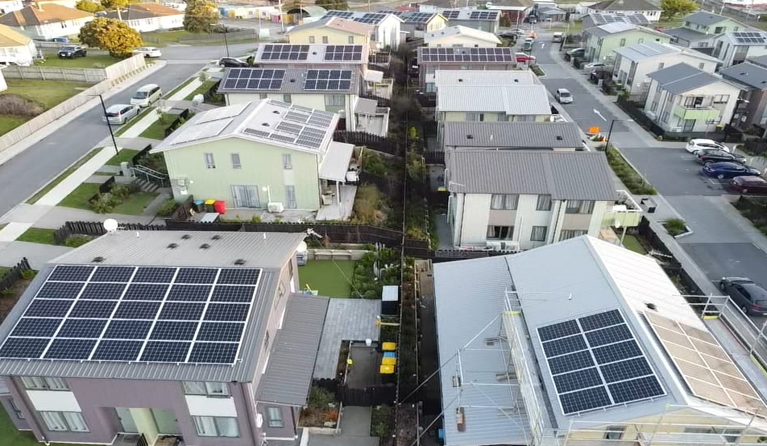
The Electricity Authority has approved two exemptions and technical and non-controversial amendments to the Electricity Industry Participation Code 2010 (the Code) to facilitate an energy sharing trial led by Kāinga Ora and Ara Ake.
The exemptions will enable Wellington Electricity Lines Limited, as the distributor, and Intellihub Limited, as the metering equipment provider, to form part of a multiple trading model which has the potential to play a role in reducing energy hardship.
“The electricity industry is changing significantly. New technology and the pace of change are testing market rules that were designed for different circumstances years ago. The rules will need to change to enable innovation and alternatives to traditional single buyer and seller electricity models,” says Sarah Gillies, Chief Executive of the Electricity Authority.
The trial will take place in the Wellington region over five years and will enable energy sharing across selected the Kainga Ora housing.
Maximising solar benefits
Minister of Energy and Resources and Housing Hon Dr Megan Woods says: “This is a great opportunity to maximise the value of the Government investment made in solar and shows how it can be used to reduce energy hardship.”
The Government’s Māori and Public Housing Renewable Energy Fund provided Kāinga Ora with the funds to invest in and install solar assets at 200 homes in the Wellington Region, reducing electricity bills for a number of its customers across the region.
"Kāinga Ora Chief Executive, Andrew McKenzie says energy innovation solutions are not always equitable—a good example is where some people are unable to benefit from solar due to the size or orientation of their roof.
“This trial provides a unique solution to maximise the value of solar technology by sharing the benefits with customers who can’t get solar on their homes” says McKenzie.
Ara Ake has collaborated with Kāinga Ora to set up the trial, and it believes the benefits of distributed energy resources, such as solar assets, will be shared more widely.
Ara Ake Chief Executive, Dr Cristiano Marantes, says “This initiative is an excellent example of how innovation and collaboration can deliver practical solutions to address energy hardship.”
“The partnership between Kāinga Ora, the Authority and Ara Ake has led to the development of a solution, which has the potential to be truly transformational and to put Aotearoa New Zealand at the forefront of global innovation to deliver a more sustainable, resilient and equitable energy future. I call this “collabor-action”, says Dr Marantes.
The Code amendments have enabled the trial to go ahead with the benefit of Kāinga Ora tenants being able to have their choice of retailer. This solution, and the turnaround on the decision, are critical components to responding to the transition to low emissions energy.
Innovating new models
In the trial, a multiple trading relationships model - one where more than one retailer is involved - will be used to enable energy sharing across selected Kāinga Ora homes. The aim of multiple trading relationships is to give consumers more choice about how to use the electricity they produce and consume.
The import and export channels of electricity will be separated at household installation control points so that excess generation can be sold back to a retailer and the revenues can used to benefit other Kāinga Ora customers. The benefit of the solar panels can be maximised and shared with a wider group of Kāinga Ora customers.
The two Code exemptions allow Wellington Electricity and Intellihub to operate without the potential compliance issues and breaches of the Code.
Wellington Electricity Chief Executive, Greg Skelton, says: “Along with our continuing support of the EnergyMate programme in Wellington, we see this trial as another opportunity to work with our industry colleagues to help address the issue of energy hardship in our region.”
Corrie Stobie, Intellihub Limited’s Regulatory Affairs Manager adds: “Working with Kāinga Ora, Ara Ake and Wellington Electricity to enable better use of energy and ultimately benefit customers in energy hardship will also further our ambitions to enable intelligent energy use across Australia and New Zealand.”
The Electricity Authority views the trial as an opportunity to assess and learn more about this model of energy sharing using multiple trading relationships, alongside industry. This can be used to develop a more enduring solution for all New Zealanders. The trial also reduces the likelihood of unintended consequences for consumers and industry in any future Code changes.